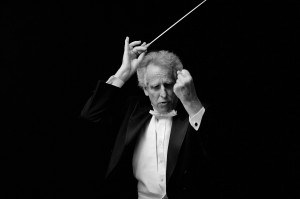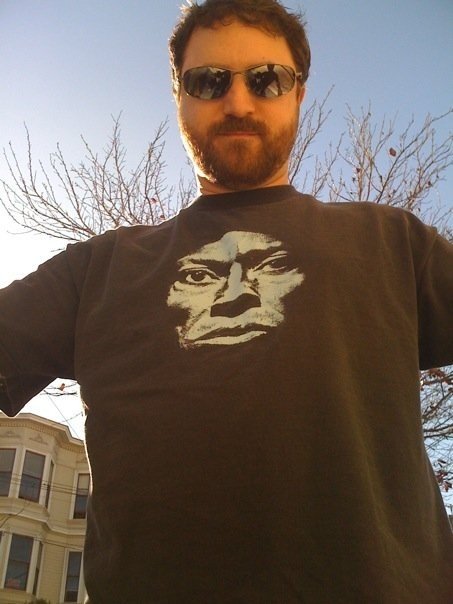You Ain’t Seen Nothing Yet
The first inkling I had of the connection of his talk to the jazz world was early on when he said, “there are some people who think that classical music is dying. And there are some of us who think you ain’t seen nothing yet.” At the risk of beating a dead horse, this reminded me of the brouhaha that arose over Terry Teachout’s piece in the Wall Street Journal titled “Can Jazz Be Saved?” Every jazz blogger and musician on the internet chimed in with their thoughts on the state of jazz and what can be done to “save” it. NPR’s A Blog Supreme even created the Jazz Now Project which put the spotlight on many wonderful young jazz musicians playing today. There was a lot of merit and some great ideas in these responses.
But with every one of the arguments put forward, including my own, I felt there was some big point being missed. It came to me while watching Zander, and hearing him say, “classical music is for everybody. Everybody.” So, too, is jazz. The big question to be answered is what can we do to help people realize this?
Everybody Loves Classical Music
The parallels continued as Zander explained his view of the classical world. Substitute the world “jazz” for “classical” and this next paragraph is equally true:
“You know, my profession, the music profession doesn’t see it that way. They say 3 percent of the population likes classical music. If only we could move it to 4 percent our problems would be over. I say, “How would you walk? How would you talk? How would you be if you thought 3 percent of the population likes classical music? If only we could move it to 4 percent. How would you walk? How would you talk? How would you be if you thought everybody loves classical music — they just haven’t found out about it yet.” See, these are totally different worlds. “
He then goes on to give a demonstration to the 1600 member audience. You can see the whole thing in the video, which I have embedded below. I will summarize by saying that Zander shows in a matter of 10 minutes how you can take a group of people, most of whom are not fans of classical music, and turn them into fans. He does this simply by doing his job, which he sees as “awaken[ing] possibility in other people.” Not only does he play them a beautiful Chopin Prelude, but he explains what Chopin was doing is very simple terms, explains the thought process behind both the composition and his performance of the piece, and then plays it to the audience who now has a frame of reference for the piece.
Awakening Possibility
I talk often on this blog about my opinion that being a working musician these days is about much more than playing music. It’s about marketing, promotion, social networking, actual networking and so much more. Through Zander’s talk I am also reminded that it is about “awaken[ing] possibility in other people.” Or, in other words, about education.
In my reponse to Teachout I posited that we need to change the perception of jazz and bring our music to young fans rather than wait for them to come to us. But there’s something else that is necessary: context. We need to find a way to hip them to why jazz moves us the way it does. Just like Zander energized his audience with his passion, we need to do the same with our audiences.
Shining Eyes
As a conductor, Zander realized one day that he needed to instill in and the bring forth his own passion from the musicians in his orchestra. He said he knew he was successful at this when he saw the musicians’ eyes shining. And when he didn’t he asked, “Who am I being that my players’ eyes are not shining?”
We should ask ourselves the same question. Why is it that people’s eyes don’t shine when they hear jazz? Why is it that jazz has the negative perceptions attached to it that it does? And most importantly, what can we do to change it? If their eyes aren’t shining, it’s not their fault, it’s ours! It means we’re not doing a good enough job of giving them some kind of context into which to place our music.
Watch how Zander leads his audience through the Chopin piece, and how much fun he has in the process. It’s a thrill to lead someone to a place where they can appreciate something they couldn’t before. Remember back to when you first heard jazz, when you started to put the pieces together and learn about what makes it work, and how thrilling it was! Or the first time you were able to explain to someone why it is that Miles or Monk or Duke or Ella moves you.
I remember a day when my wife asked me how it was that I could tell one saxophone player from another after only a few notes. She was amazed that I could do it. So I played her some Dexter Gordon and some Stan Getz and talked about the difference in their tone, their attack, their ideas. And she got it! When I quizzed her later she could easily tell the two apart. And not only did that thrill me, but it thrilled her! It gave her some way to contextualize the music, to get inside it a bit more, and to enjoy it more fully. This is what we need to do with our audiences!
The last quote I’ll leave you with is this: “I have a definition of success. For me it’s very simple. It’s not about wealth and fame and power. It’s about how many shining eyes I have around me.”
A Challenge
So today I challenge you: what can you do to make your audiences’ eyes shine? Think about this and let me know if you have any ideas. Then, try it out at your next gig and report back. I’ll wager that if you go into your next gig with this in mind you’ll come out the other side with a wealth of epiphanies and some new fans to boot!
Here is the full talk. I guarantee it’s worth the 20 minutes!
Since 1979, Benjamin Zander has been the conductor of the Boston Philharmonic. He is known around the world as both a guest conductor and a speaker on leadership — and he’s been known to do both in a single performance. He uses music to help people open their minds and create joyful harmonies that bring out the best in themselves and their colleagues.
His provocative ideas about leadership are rooted in a partnership with Rosamund Stone Zander, with whom he co-wrote The Art of Possibility.





Great site!
Jason when I read your post I thought back through my (first) year of regular and concentrated reviewing of the London scene. And tried to remember the gig where I’d tried hardest to transmit the kind of euphoric joy I think you’re getting at.
Try this
http://londonjazz.blogspot.com/2009/09/eliane-elias-marc-johnson-review.html
Ben – thanks for stopping by!
Sebastian – “Euphoric joy” is a great way to put it. When we’re really hitting, that’s what happens. And it’s our job to communicate that to our listeners in whatever way we can. It might be purely through the music, but it might also include talking about WHY that happens, how it happens, and what it means to us. Thanks for the comment.
http://www.youtube.com/watch?v=sYXB6pQvJcg
Here’s a link to a 1966 interview w/ Bill Evans-his theory that Jazz is a ‘revival of improvised music not seen since 1800’s classical music’ and his views on Jazz as seen by the general public, he’s such a clear thinker!! btw- Thanks for writing this Blog-
Hi Jason! This was marvelous and moving, and I’m glad I finally got around to watching it. The take-home point for me is the optimistic view Zander has of music that has yet to be discovered by so many people, rather than of lamenting its demise or vegetative state. Our local station’s motto is “Keep Jazz Alive,” which always conjures up an image of a patient in a coma to me. Great work, fellow West-coaster!
Amen, Alexa! Thanks for stopping by the blog.
{ 2 trackbacks }